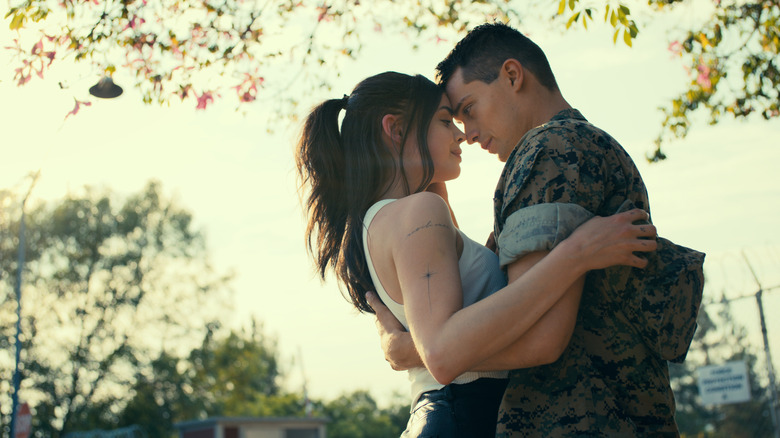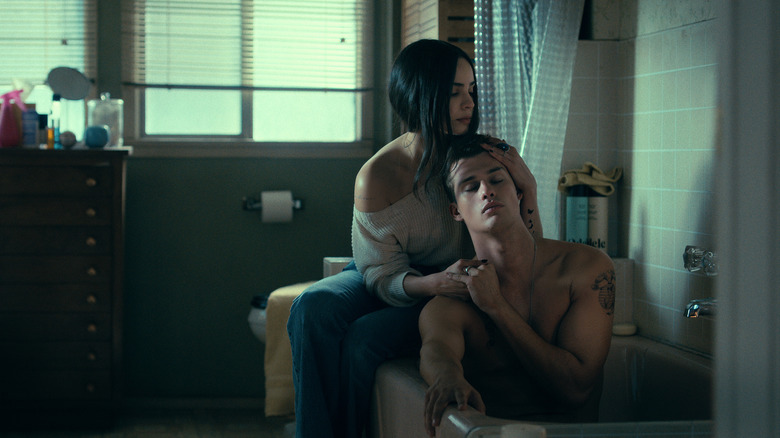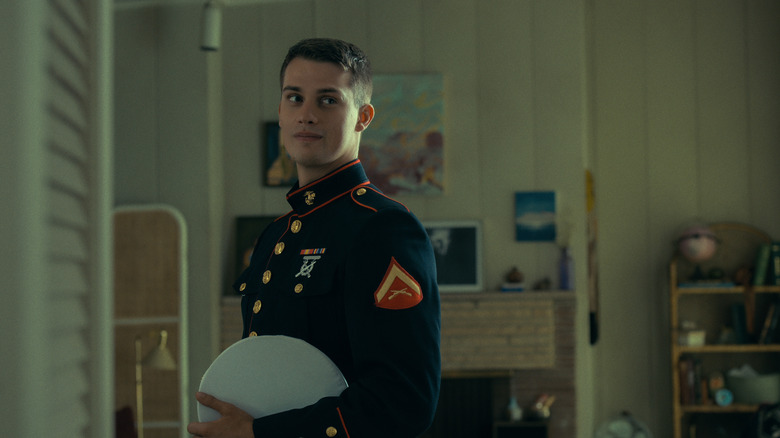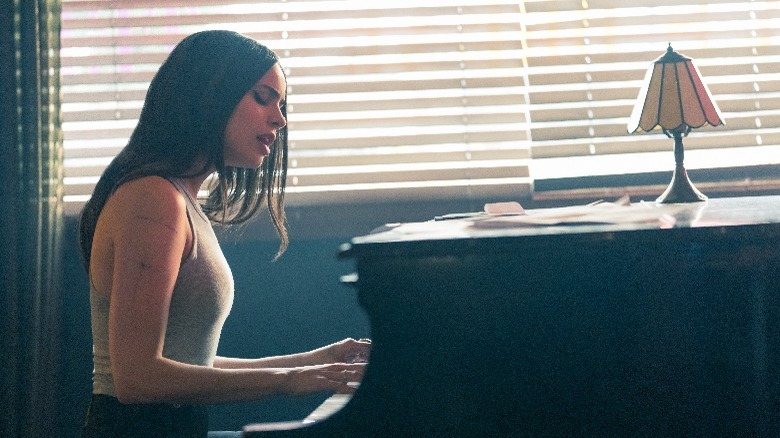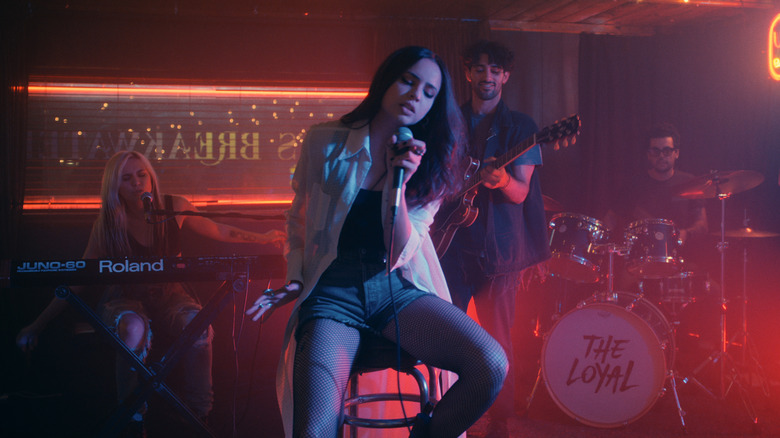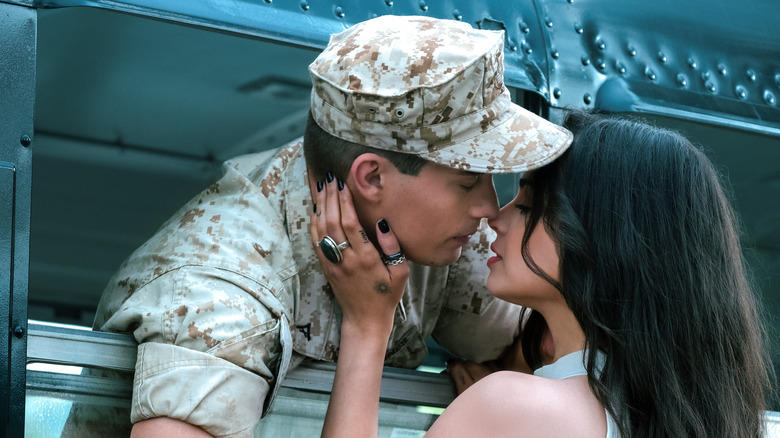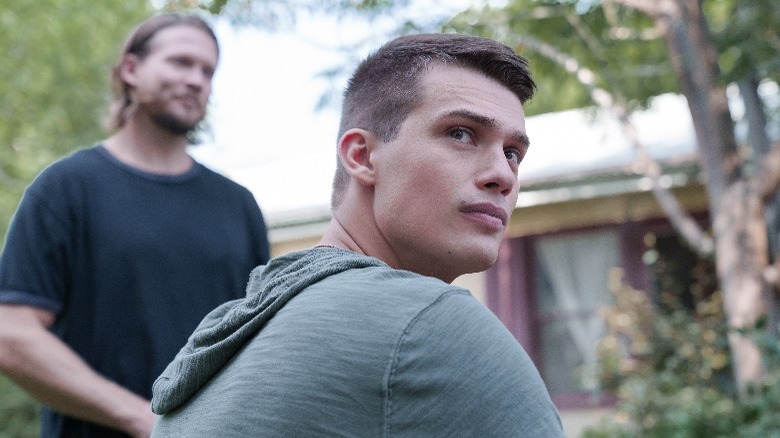The Best And Worst Things About Netflix's Purple Hearts
Netflix's "Purple Hearts" is the latest swoon-worthy romance to grace our screens and make us wish our real-life love affairs were more exciting. Based on the novel of the same name by Tess Wakefield, the movie stars former Disney kid Sofia Carson as headstrong singer-songwriter Cassie and brooding Brit Nicholas Galitzine as Luke, a dedicated soldier (via IMDb).
Although they come from two completely different worlds, Cassie and Luke discover they have something in common and hatch a plan to marry so they both have access to lucrative military benefits. However, as the official log line teases, "When tragedy strikes, the line between real and pretend begins to blur." Carson, who fans will know from the hit series "Descendants," served as an executive producer on the project, as well as co-writer of the original soundtrack.
In an exclusive interview with The List ahead of the film's release, Carson eloquently shared what drew her to the plot, telling us that the film has been five years in the making. "It was a beautiful love story, but it was a love story with really important social political messages," Carson told us. "And the heart of it, which is what captured my heart at first read, is that it's truly a story [that] captures the zeitgeist of our generation so beautifully."
There's plenty to enjoy about "Purple Hearts," but there are also a few dodgy moments that — while they don't spoil the viewing experience — certainly gave us pause while watching.
** Spoilers for "Purple Hearts" to follow **
Best: The lead performances are very convincing
Due to the nature of its premise, "Purple Hearts" is frequently melodramatic and unavoidably saccharine. However, no matter how wild things get, Sofia Carson and Nicholas Galitzine remain utterly convincing in their respective roles. There's more of a case made for Luke as sympathetic (more on that below), but both actors paint their characters with fascinating shades of gray, hinting at their underlying hurt and making the inevitable love affair more convincing.
Carson has the tougher job, since Cassie could easily come across as judgmental and domineering, but her undeniable chops as a singer-songwriter and Cassie's clear affection for Luke — especially after he gets injured and she has to look after him — soften her. Likewise, as Luke, Galitzine is tasked with delivering a perfect American brogue, and communicating a lifetime of bad decisions coupled with an unquenchable desire to prove his worth to a disapproving father.
"Purple Hearts" doesn't always make a huge amount of sense, but the lead performances cannot be faulted, consistently grounding it.
Worst: The pro-military angle is uncomfortable
Despite the fact that Luke gets injured in combat and Cassie's lifelong friend (played by "IT" star Chosen Jacobs) is killed, "Purple Hearts" almost plays like a recruiting tool for the U.S. military. When Cassie and Luke first cross paths in the bar where she works and regularly performs with her band, his buddies make sexist comments toward her, leading Cassie to understandably storm off.
Luke catches up with her but, rather than apologize for their behavior, he tries to justify it, before lambasting Cassie for not showing the proper respect to the men fighting for their country and, by extension, her life. As Cassie softens towards Luke, she becomes more and more pro-military, even giving a rousing speech in honor of the brave men fighting overseas during one of her gigs.
A fleeting attempt is made to present another member of his team as a bad egg, but Cassie is quickly made into the villain for fighting with him. Every time the military is referenced in "Purple Hearts," it's presented as the greatest and most noble job in the world, with plenty of grandiose proselytizing employed to justify enlisting, regardless of the consequences.
Even when Luke is sentenced to jail time for defrauding the government, it's painted as a positive experience. "Purple Hearts" is like the "Yvan Eht Nioj" moment in "The Simpsons" played completely straight. The sole discerning opinion comes from Cassie, who quickly falls in line.
Best: The songs are genuinely catchy
Considering Cassie is an aspiring singer-songwriter, it's lucky that the actor playing her, Sofia Carson, is an established pop star in her own right. The Disney alum has released a ton of music over the years, including as part of her previous projects, so it's unsurprising she had a hand in crafting the songs for "Purple Hearts." The catchiest one, "Come Back Home," is the first track Cassie writes as a result of her burgeoning relationship with Luke.
As Carson revealed on Instagram, it was also "one of the first songs" she penned for the movie. The other tracks Cassie and her on-screen band, The Loyal, play throughout the flick are equally enjoyable, showcasing Carson's impressive pipes above all else. There are also a couple fun covers sprinkled in, including a modern take on Neil Diamond's "Sweet Caroline" and a slowed-down version of mega-hit "Feel It Still."
Carson herself has been writing music since the tender age of 11, telling us during our exclusive interview that she worked tirelessly to write the film's music from Cassie's perspective, rather than her own. "I had never written a soundtrack before or written songs that had to serve a particular purpose for a story. It's a very different experience than just writing whatever you're feeling in that moment," she explained.
Worst: Cassie's struggle isn't always believable
"Purple Hearts" should be commended for showing, first and foremost, the extreme lengths many Americans must go to in order to acquire the urgent medical care they need. This is communicated predominantly through Cassie's Type 1 diabetes, which causes her to pass out at her job shortly after coming off stage. Likewise, we see her squeezing out the final few drops from a bottle of insulin in a desperate attempt to make it last longer.
However, once her fake marriage to Luke is complete, Cassie gets everything she needs and her condition is largely left on the back-burner aside from one moment when her blood sugar gets dangerously low (it's ironic she suffers from diabetes considering how mawkish the movie is, of course). The wannabe singer is also working several jobs at once, but she can't make rent or pay her bills, making survival a constant struggle.
And yet, Cassie lives in a spacious apartment of which even Monica Gellar would be envious. Sure, it's messy, and the doorknob is busted but otherwise it's a pretty nice place, and has lots of room for Luke to crash with Cassie once he gets back from Iraq. At least Cassie wears the same pair of flared jeans and battered boots for most of the movie, solidifying how little disposable income she has.
Best: The central romance feels well-earned
In a review of the titular novel on which "Purple Hearts" is based, from Reading Books Like a Boss, it's argued not enough time is spent developing the central relationship. The reviewer opined, "The author gives us no build-up at all, and at the very end both mysteriously decide they love each other and then the novel ends." Thankfully, the movie doesn't have that problem. Plenty of time is dedicated to establishing who both characters are, before bringing them together.
Moreover, Sofia Carson and Nicholas Galitzine have terrific chemistry together, making all their "firsts" exciting. We know they're pretty much guaranteed to get together in the end, otherwise there's no story, but director Elizabeth Allen Rosenbaum and co-writers Liz W. Garcia and Kyle Jarrow place enough obstacles in the duo's path that it doesn't seem predetermined. Cassie and Luke are clearly attracted to each other, but their differing viewpoints might be too much.
"Purple Hearts" entertainingly plays with our rom-com expectations in its final moments, too, by having Cassie do the last-minute dash to stop Luke and tell him she loves him before he goes away. Crucially, she doesn't have to give up her dream of performing at the Hollywood Bowl in order to do so, and he's supportive of her career throughout. Put simply, it's easy to root for these two to work things out. They also fall in love through emails and FaceTime calls, which is both modern and realistic.
Worst: The tone is all over the place
It's mainly a movie about a fake marriage, but "Purple Hearts" also finds time to tackle plenty of other issues, usually to its detriment. Cassie and Luke's blossoming romance is compelling, but the film repeatedly tries to pull our attention elsewhere with dodgy narrative choices that add nothing substantial to the mix —Luke's drug dealer, to whom he's apparently owed thousands of dollars for years, feels like he's in a different film entirely.
Further, his father is a one-dimensional jerk who's guaranteed to turn Luke in if he finds out what he and Cassie have done, especially because he's a staunch military man himself. Worse still, in the end, Luke's father seems to be grudgingly proud of his son, but it's unclear why. Elsewhere, Frankie, Cassie's childhood BFF (Chosen Jacobs), is killed in combat by the same IED that didn't manage to take Luke's legs off, which is a confusing and unnecessary choice. Cassie doesn't even seem to mourn him for long, which is also strange.
Not nearly enough of an attempt is made to portray her as a nagging shrew — she reads more like a self-sufficient liberal — but Cassie is constantly put in her place by men. Moreover, these ultra-serious teaching moments chafe against cheesy lines like, "I wanna be the one who you run back to." Fortunately, the gorgeous, sun-dappled cinematography, by Matt Sakatani Roe, bathes everything in a warm glow, even in the movie's less persuasive moments.
"Purple Hearts" releases globally on Netflix on July 29.
